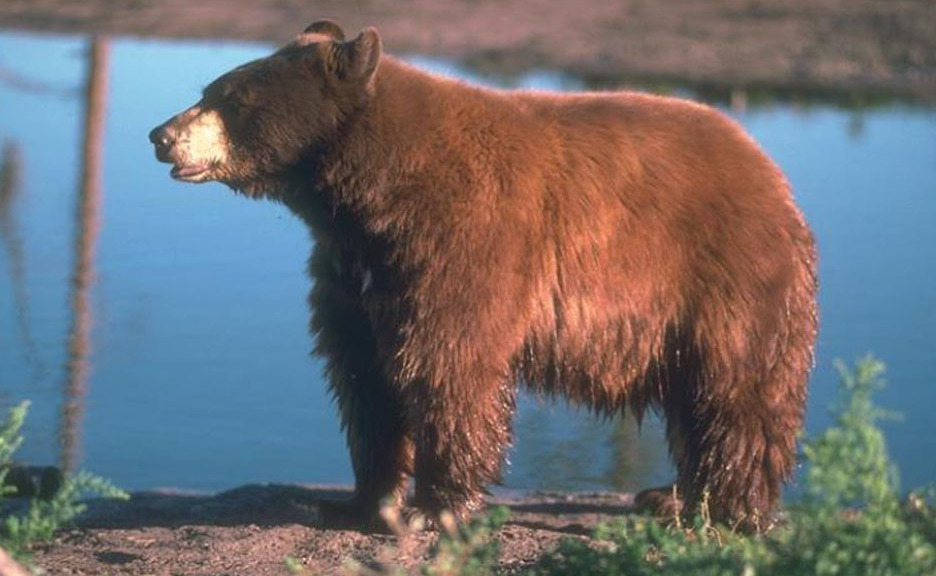Be ‘Bear Aware’ this Spring and Summer

by CDFW
6-2-2017
Website
As spring and summer beckon people outdoors, California’s black bears are also active after a long winter hibernation. The California Department of Fish and Wildlife (CDFW) takes this opportunity to highlight the native black bear – one of most adaptable animals in the state – and encourages citizens to help reduce nuisance encounters with this iconic mammal by being “bear aware,” which means taking responsible actions that promote responsible behavior while living and recreating in bear country.
California has a healthy population of black bears that typically prefer remote mountainous areas. But as more people frequent parks and wilderness areas and choose to live in or near bear habitat, bears become more accustomed to the presence of people and as a result display less shy and elusive behavior.
“Over the years, we have seen bear behavior patterns change significantly”, said Marc Kenyon, manager of CDFW’s human/wildlife conflict program. “Each spring and summer we receive hundreds of calls from the public reporting anything from bears raiding food in campgrounds to bears taking dips in residential swimming pools. Bears have also been known to break into homes and cabins and steal food right off of the kitchen counter – sometimes while the occupants are home.”
Kenyon notes that bears have a highly specialized sense of smell. According to Kenyon, a bear can smell bacon frying from about three miles away, given the right conditions. An animal that is specialized at finding food sources coupled with greater numbers of people at its doorstep, can create a storm of human/wildlife conflicts. However, nuisance-bear behavior may be significantly reduced – or even eliminated, if people change their behavior.
Tips for Bear-proofing your Home, Rental or Timeshare:
In settled areas close to bear habitat, bears may venture in searching for food. The best defense against bear break-ins and bears in your yard is to eliminate attractants to your property by following these tips:
- Purchase and properly use a bear-proof garbage container.
- Wait to put trash out until the morning of collection day.
- Do not leave trash, groceries or pet food in your car.
- Keep garbage cans clean and deodorize them with bleach or ammonia.
- Keep barbecue grills clean and stored in a garage or shed when not in use.
- Only provide bird feeders during November through March and make them inaccessible to bears.
- Do not leave any scented products outside, even non-food items such as suntan lotion, insect repellent, soap or candles.
- Keep doors and windows closed and locked.
- Consider installing motion-detector alarms and/or electric fencing.
- Harvest fruit off trees as soon as it is ripe, and promptly collect fruit that falls.
- Bring pets in at night. Provide safe and secure quarters for livestock at night.
- Consider composting bins as opposed to open composting.
- Securely block access to potential hibernation sites such as crawl spaces under decks and buildings.
- Do not spray bear spray around property – when it dries, it can serve as an attractant.
- Do not feed deer or other wildlife – not only can it be unlawful, it will attract bears to your property.
Tips for Bear-proofing your Campsite:
Maintaining a clean campsite is the responsible and safe thing to do when visiting bear country. Here are a few tips for bear proofing your campsite:
- Haul garbage out of camp regularly – check with camp host or other camp personnel about safe garbage storage. Use bear lockers if available.
- Store food (including pet food) and toiletries in bear-proof containers or in an airtight container in the trunk of your vehicle if bear lockers are not available. In some areas, food storage in the trunk is not advisable. Check with camp or park personnel.
- Clean dishes and store food and garbage immediately after meals.
- Clean your grill after each use.
- Never keep food or toiletries in your tent.
- Change out of clothes you cooked in before going to bed.
- Do not clean fish in camp.
- Do not leave pets unattended in camp or sleeping outside.
Tips for Hiking in Bear Country:
- Bears may react defensively if your presence is not known – make noise while hiking. Talk loudly or whistle.
- If possible, travel with a group of people.
- Avoid thick brush and walk with the wind at your back so your scent is ahead of you.
- Watch for bear sign along trails – scat, tracks and stripped bark off trees.
- Avoid sites where dead animal carcasses are observed.
- If you see a bear, avoid it and give it the opportunity to avoid you.
- Leash dogs while hiking in bear country – dogs can surprise and aggravate bears – bringing the bear back to you when the dog flees from the bear.
Facts about Black Bears:
- Black bears are the only bear species found in California. They range in color from blonde to black, with cinnamon brown being the most common.
- There are an estimated 35,000 bears in California.
- Males are much larger than females and can weigh up to 500 pounds, although average weight is about 300 pounds.
- Black bears can sprint up to 35 mph and they are strong swimmers and great tree climbers.
- Bears are omnivorous eating foods ranging from berries, plants, nuts and roots to honey, honeycomb, insects, larvae, carrion and small mammals.
- Bears typically mate in June and July.
- As winter approaches, bears will forage for food up to 20 hours a day, storing enough fat to sustain them through hibernation. Bears often hibernate in large hollow trees 40 to 60 feet off the ground.
- Bear cubs are born in winter dens in January and February and are hairless, deaf and blind.
- Black bear attacks are rare in California and typically are defensive in nature because the bear is surprised or defending cubs; however, bears accustomed to people may become too bold and act aggressively.
- Female black bears will often send cubs up a tree and leave the area in response to a perceived threat. Do not remain in the area – when you leave, she will come back for her cubs.
For more information about black bear biology, please visit Conservation/Mammals/Black-Bear/Biology.
For information about bear-proof containers and where to buy them, please visit Keep-Me-Wild/Products.
More Reports

6-1-2017
Question: Is it legal to scout wild game from a non-motorized paraglider? If so, would it also be legal to...... Read More

5-30-2017
As the summer months approach and with increased sightings of White Sharks off Southern California beaches, the California Department of...... Read More
